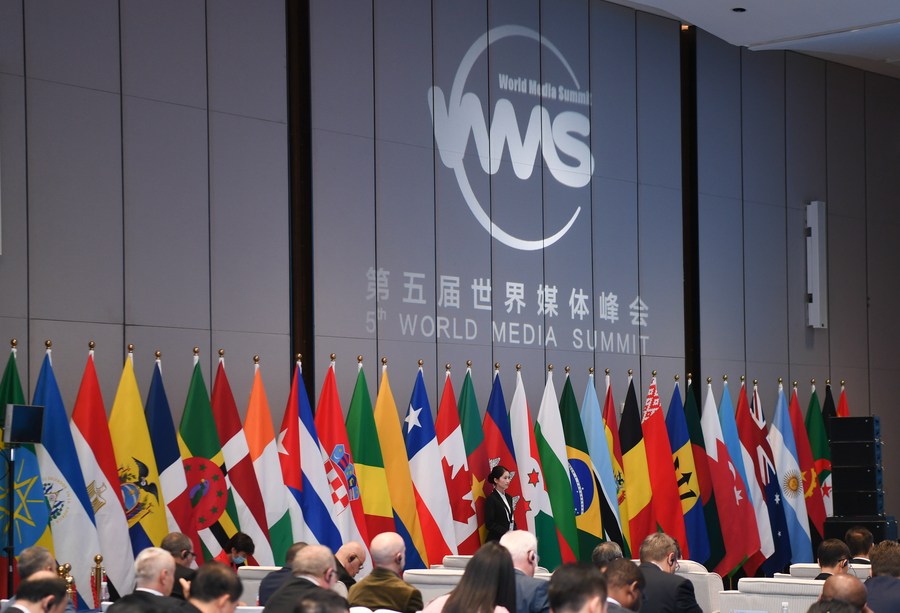Chinese modernization inspiring for world, say participants at World Media Summit

This photo taken on Dec. 3, 2023 shows the opening ceremony of the 5th World Media Summit (WMS) in Guangzhou, south China's Guangdong Province. (Xinhua/Deng Hua)
Coming from various regions including the Middle East, Latin America, Africa and Europe, the participants agree that the best way to know China's development is to "see with your own eyes."
GUANGZHOU, Dec. 7 (Xinhua) -- Participants at the ongoing fifth World Media Summit in the Chinese cities of Guangzhou and Kunming shared their insights about Chinese modernization, saying it is inspiring for the world.
The summit provides them with an opportunity to personally experience China's approach to modernization, its people-centered philosophy and its emphasis on innovation, they said.
TO SEE IS TO BELIEVE
Coming from various regions including the Middle East, Latin America, Africa and Europe, the participants agree that the best way to know China's development is to "see with your own eyes."
Mohamad Malli, press center manager of the Lebanese Ministry of Information, said that he used to know China from reading as a poor country with poverty-stricken people.
"But when I come and see with my own eyes, I find you have clean and good nature, polite and educated people," he said.
General manager of Grupo Multimedios (Mexico) Guillermo Franco Gallegos has a similar view, saying that people will know whether the China they watched on TV, read in the newspaper, or heard from others is true after coming to see it by themselves.
"If I didn't come here, I wouldn't know that it is a great civilization," said Peter Tata Mabu, deputy managing editor of Cameroon News and Publishing Corporation.
Janna Tolstikova, CEO of TV BRICS, said, "This kind of events (the fifth World Media Summit) brings opportunities for participant to see with their own eyes what's happening here."
PEOPLE-CENTERED
A key hallmark of Chinese modernization is its commitment to people-centered development, prioritizing the well-being, empowerment and quality of life for its citizens.
"The key element of that modernization in China is what can be referred to as a people-centered modernization, people-centered development," said Mark Levine, an American professor at the Minzu University of China.
The economy and societal development are important, but it all starts with improving the lives and living conditions of Chinese people, Levine said.
Martin Jacques, a renowned British scholar, said that China's modernization, which is people-oriented, "seeks to humanize modernity, to put people's needs and interests before narrow material gain, to prioritize people's spiritual needs above those of narrow consumerism."
"The prosperity of a society is inseparable from the well-being of its people which is the most crucial issue," said Zafar Uddin Mahmood, president of the Understanding China Forum, a Pakistan-based think tank.
The fact that China has nearly lifted 800 million rural individuals out of poverty serves as the best proof of the people-centered philosophy of Chinese modernization. And now, China is embarking on a new journey towards constructing a modern socialist country.
INNOVATION-DRIVEN
Citing the development of trains, construction, and autonomous vehicles, Chun Wai Wong, chairman of the Malaysian National News Agency, said Chinese modernization is advancing tremendously.
"Every time I come to China, it's an eye-opener for me," he said.
The reason why China can modernize at such a fast pace is that the country sticks to an innovation-driven strategy. The tour to Huawei village and Tencent headquarters on the sidelines of the summit organized by Xinhua has left a profound impression on the participants.
Jose Juan Sanchez, chief of Brazil's financial and agricultural information provider CMA Group, said that he was deeply impressed by the rapid pace of China's technological development and its substantial support for talent.
Echoing Sanchez, Khalid Mubarak SH S Al-Shafi, editor-in-chief of The Peninsula Newspaper, said, "This is my second visit to China, and I'm amazed by the technological advancement and significant development."
Roy Iwan Lie-Atjam, an editor of Diplomat Magazine, said it's eye-opening for him to see so many technological advances.
The veteran editor from the Netherlands said he would tell the readers that "we had a completely wrong view about China."
Photos
Related Stories
- To understand China, key lies in understanding Chinese modernization
- Experts, scholars discuss paths to modernization in developing countries
- China Overseas Friendship Association urged to promote China's modernization drive
- Turkish party leader describes China's modernization as miracle
- A Grenada journalist's first-hand experience of Chinese modernization
Copyright © 2023 People's Daily Online. All Rights Reserved.









